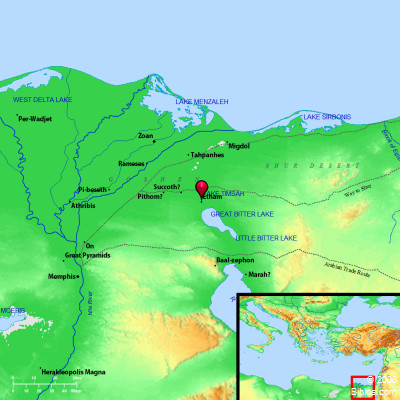Atlas  Etham and surrounding region
Maps Created using Biblemapper 3.0Additional data from OpenBible.infoOccurrences Exodus 13:20 They took their journey from Succoth, and encamped in Etham, in the edge of the wilderness. Numbers 33:6 They traveled from Succoth, and encamped in Etham, which is in the edge of the wilderness. Numbers 33:7 They traveled from Etham, and turned back to Pihahiroth, which is before Baal Zephon: and they encamped before Migdol. Numbers 33:8 They traveled from before Hahiroth, and passed through the midst of the sea into the wilderness: and they went three days' journey in the wilderness of Etham, and encamped in Marah. Encyclopedia ETHAMe'-tham ('etham; Othom, Exodus 13:20; Bouthan, Numbers 33:6, 7; in 33:8 the Septuagint has a different reading, "in their wilderness" showing another pointing for the word):
The name used to be explained as the Coptic Atium, "border of the Sea" (Gesenius, Lexicon, under the word) which would agree with the Hebrew (Numbers 33:8) where the "wilderness of Etham" is noticed instead of that of Shur (Exodus 15:22) East of the Red Sea (see SHUR). At Etham (Exodus 13:20), the Hebrews camped in the "edge," or at "the end," of the desert West of the sea that they were to cross (see EXODUS). This camp was probably near the North end of the Bitter Lakes, a march from Succoth. Brugsch (Hist. Egypt, II, 359) would compare Etham with the Egyptian Khetam ("fort"), but the Hebrew word has no guttural. The word Khetam is not the name of a place (see Pierret, Vocab. hieroglyph., 453), and more than one such "fort" seems to be noticed (see PITHOM). In the reign of Seti II a scribe's report mentions the pursuit of two servants, apparently from Zoan, to the fortress of I-k-u southward, reaching Khetam on the 3rd day; but if this was the "Khetam of Rameses II," or even that "of Minepthah," it would not apparently suit the position of Etham.
See MIGDOL.
C. R. Conder. Strong's Hebrew H864: Ethama place in Egypt |
    |




